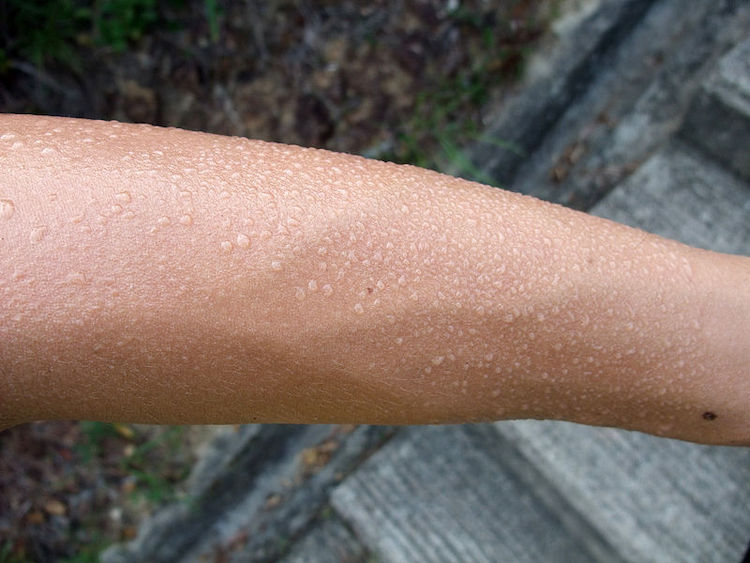Movement = Sweat, And Sweat = Health
You might think of sweating as an unpleasant experience, but getting hot and sticky can offer some amazing benefits that far outweigh the temporary discomfort you might feel. Look closely and you might notice improved skin, stress relief, energy boosts, and even a greater sense of physical attraction – and that’s only scratching the surface of how regularly getting your sweat on can benefit your overall wellbeing.
What even is sweat? And, for that matter, why do you sweat? These might seem like parochial questions, but sweat is a lot more complex than it might seem. Sweat is not only a way for your body to purge waste, but it’s also your natural HVAC system.
It’s a pretty powerful one, too, considering the average person has between 2 and 4 million sweat glands. While the exact makeup of sweat varies from person to person, sweat is mostly a mixture of water and small amounts of other chemicals like:
- Ammonia
- Salt
- Sugar
- Urea
Interestingly, individual sweat composition and how your sweat glands function – or don’t – can reveal a lot about your health. They can even be pivotal in identifying and diagnosing certain diseases. Cystic fibrosis, for example, can be diagnosed by the aptly named Sweat Test.
If you’re still hesitant to get moving and start sweating, take a look at some reasons why sweating is one of the best things you can do for your health…

Reduces Stress
Breaking a sweat has the powerful ability to increase the production of endorphins, dopamine, and serotonin – the “happy hormones” that can ease stress, anxiety, and depression.
Sweating activates your parasympathetic system. This system is responsible for controlling your glands and, when activated, can help release those happy hormones and lower your heart rate. This results in a calming effect and can even help you properly digest your food.

Purges Harmful Toxins
Did you know that sweat contains some of the same antimicrobial proteins that are known to bind with, and remove, certain bacteria and viruses in your body? Things like:
- pylori
- coli
- Epstein-Barr
The antimicrobial substances in your sweat help flush out harmful toxins and germs, keeping you healthier and cutting down your risk of getting sick.
Your sweat composition even changes depending on the toxins in your body. Some studies have shown that the sweat of tuberculosis patients contained several unique proteins related to the infection. Their presence in sweat suggests that those proteins were being carried out of the body, because your body knows best what it needs to get rid of.

Lowers Risk Of Kidney Stones
Another great bonus to sweating more is the potential to reduce the occurrence of kidney stones, especially in women.
A study conducted by the University of Washington suggests that sweating during regular exercise is enough to significantly reduce the risk of stones when combined with proper hydration. Excess salt and calcium in your system can form kidney stones over time, but sweating can restore natural balance and redirect that calcium back to your bones, where it belongs.

Detoxes Heavy Metals
One of the main functions of sweat – apart from cooling – is to detox your body. One study found that people with mercury toxicity saw their levels return to a normal range after adopting a regular workout schedule. Other heavy metals that your body also purges through sweat are:
- Arsenic
- Cadmium
- Lead
Another study found that those who exercised more had fewer toxins in their body, noting that there was a greater concentration of heavy metals excreted in sweat than in urine.

Improves Blood Flow
Because sweating sends more blood to your muscles, you could notice speedier recovery time from injuries, illnesses, and muscle strain. Studies even suggest that sweating can boost growth hormone production, which is how your body repairs itself time and again.
It’s not just your recovery time that can benefit from sweating, though. Research has shown sweating increases blood flow to your brain as well, improving mental clarity and focus.

Cuts Down On Hot Flashes
Estrogen dominance is thought to be the culprit behind hot flashes in women, menopausal or otherwise, but sweating may actually be the answer. Some research suggests that women who get plenty of exercise during menopause may experience a significant reduction in hot flashes.

Decreases Risk Of Alzheimer’s
By now you know that sweating can remove heavy metals from the body, promote relaxation, and strengthen blood flow to the brain, all of which have been shown to help prevent and treat Alzheimer’s Disease.
Frequent or daily sauna use decreased the risk of Alzheimer’s in one study of Finnish men by 65%, when compared to the control group who only used the sauna once a week.

Can Remove Endocrine Disruptors
BPA, one of the most common endocrine disruptors, and its harmful effects are most easily purged through – you guessed it – sweat.
Studies also show that PCBs (Polychlorinated Biphenyls) found in older building materials and PBDES (a flame retardant chemical) are expelled through sweat and not urine, as previously thought. On your journey to cut plastic and other endocrine disruptors out of your life, don’t forget to sweat them out, too.

Safeguards Your Heart
Sweating, either in a sauna or through exercise, can increase circulation and strengthen your cardiovascular system. A study published in 2018 by BMC Medicine suggests that those who actively sweat several times a week were less likely to have a negative cardiovascular event.
Plus, remember how sweating can promote relaxation and stress relief? All that relaxing you’ll be doing – especially if you indulge in a few trips to the sauna – will be great for your heart health.

Improves Your Skin
Just like your gut has a delicate balance of flora that keeps it healthy, so does your skin. Sweat is thought to act like a probiotic that contributes to healthy bacteria and, as a result, healthy, glowing skin.
Some research is starting to suggest that sweating may also improve skin cell renewal and could remove the pathogenic bacteria that causes acne.

Boosts Your Mood And Might Make You More Attractive
Have you ever been at the gym and seen someone who was hot and sweaty and thought, “wow, they’re pretty good looking…”?
When you sweat, certain pheromones are released. Even if your nose doesn’t pick it up, your brain sure will. It might seem like the opposite would be true, but studies have found that while your own sweat may improve your mood and focus, male sweat can also boost the mood of women around them.

We Don’t All Sweat The Same
Despite the fact that sweating is an easy and free way to improve your health, the fact remains that not everyone is going to sweat the same. Either due to physiology or outside factors, the amount of sweat you produce can vary depending on many things, such as:
- Gender – men typically sweat more
- Weight
- Toxins
- Medical conditions like hyperhidrosis
- Tattoos/li>

How To Get The Most Out Of Your Sweat
If you’ve made it this far, you know that exercising more and sitting in a sauna are great ways to help you get your sweat on. There are just a couple more steps to ensure that you’re getting the full benefit of that extra sweat…
Stop Using Antiperspirant
It might seem gross at first, but one of the best ways to get your body sweating again is to stop fighting it with antiperspirants.
Antiperspirants usually contain heavy metals, like aluminum, that “work” by blocking your pores so you don’t sweat much – or at all, in some cases. Of course, many people are (understandably) concerned about their smell.
If that sounds like you, you can try making your own natural deodorant at home or search your local health store for a naturally made deodorant. Not all deodorants are antiperspirants. What if smell isn’t the problem though? What if you just sweat a lot?
Reduce Excess Sweating Naturally
Conventional solutions to excess sweat, especially if you have a condition like hyperhidrosis, often revolve around risky treatments including:
- Botox injections to block the sweat glands
- Temporarily collapsing the lungs and severing nerves that control sweat glands
- Mild electrocution
- Medication to combat sweating caused by other medication
Natural solutions to excessive sweating focus on balancing hormones, detoxing, and supporting the nervous system while you explore the root cause of the extra sweat.
If excess sweating is causing you to worry about more than just a few stains on your shirts, reach out to your healthcare provider for help before trying too many remedies, especially if you:
- Are pregnant or nursing
- Have eczema (sweating can also cause your skin to dry out if you have eczema, so make sure to consult your doctor before you start a sweating regimen)
- Have a heart condition
- Have high blood pressure

Stay Hydrated
Because sweat is mostly made up of water, one of the biggest risks of frequent sweating is dehydration. It’s vital that you drink plenty of water before, during, and after your workout or sauna session. The last thing you want is an unnecessary trip to the hospital.
The best way to ensure that you’re properly hydrated is to have a glass or bottle – plastic-free, of course – that you can keep refilling throughout the day.
Are you ready to start moving and break a sweat? Grab those kettlebells, hit the gym, or go for an evening walk. Remember: the more you move, the more you sweat, and the more you sweat, the better your health will likely be.
